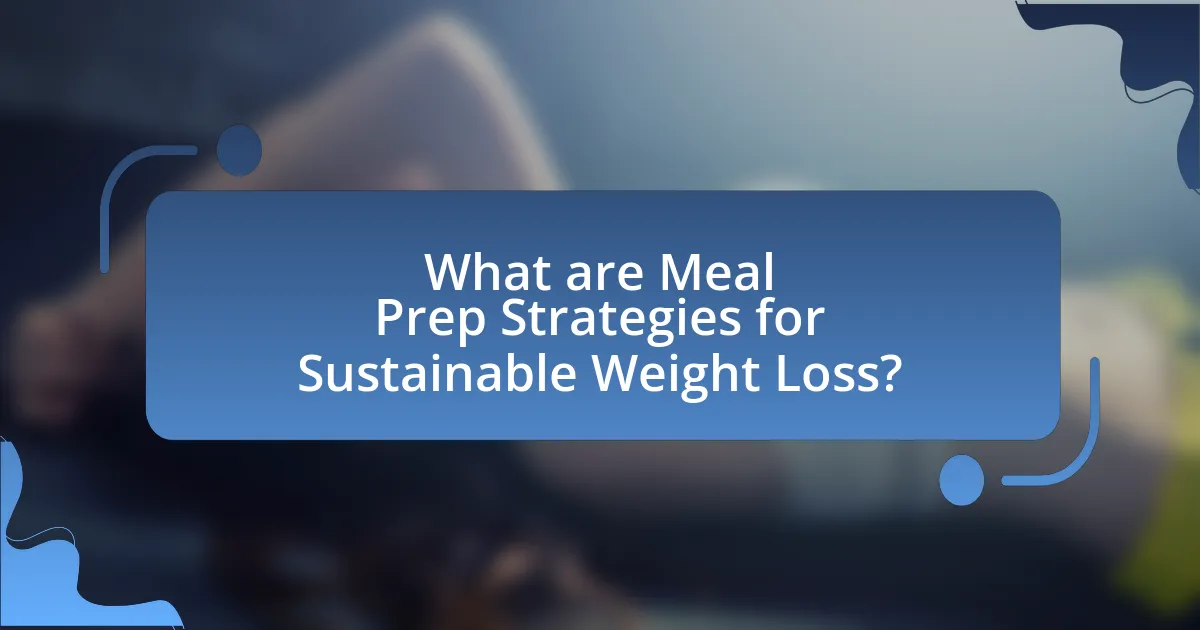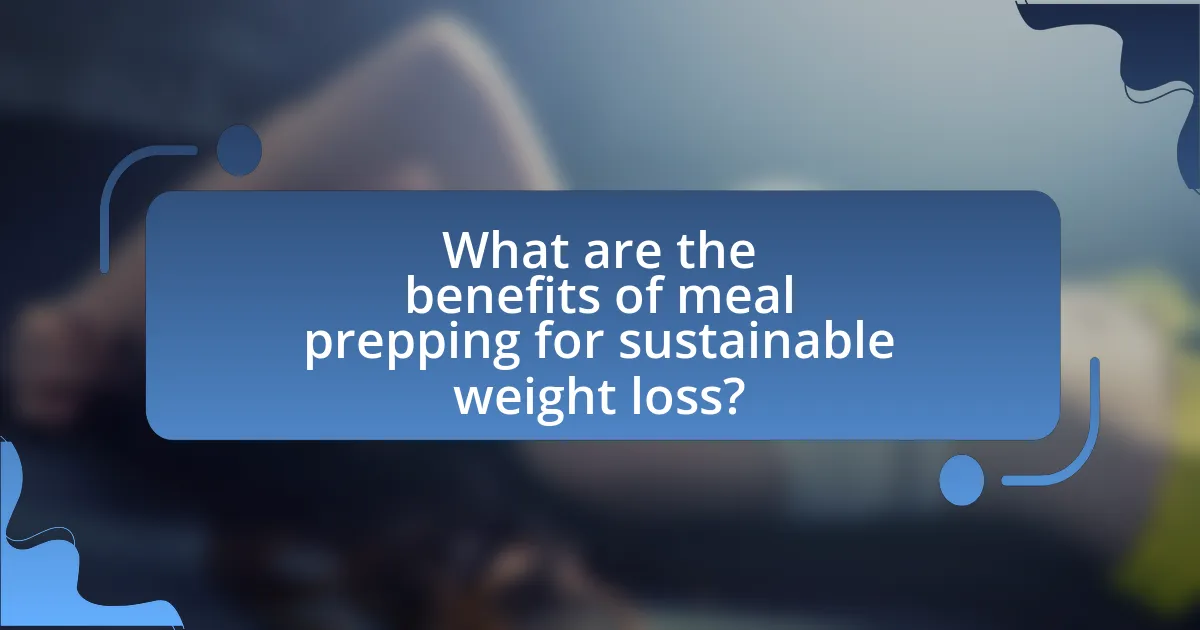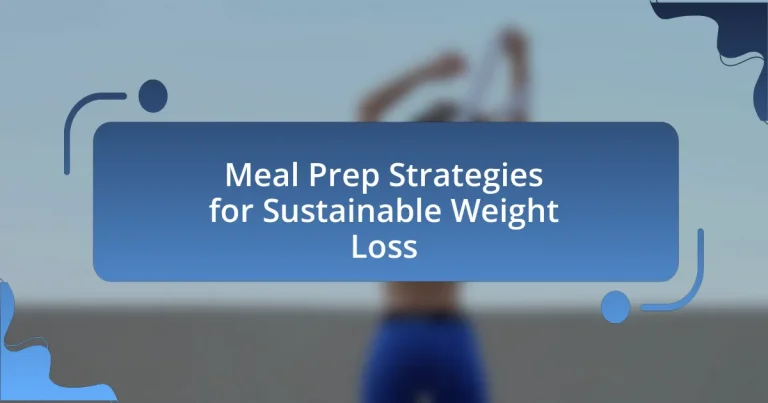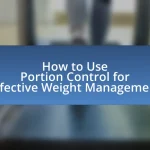Meal prep strategies for sustainable weight loss focus on planning balanced meals, controlling portion sizes, and batch cooking to promote healthier eating habits. These strategies help individuals manage calorie intake, reduce impulsive eating, and ensure access to nutritious options, ultimately supporting long-term weight management. Key principles include customizing meals to meet dietary needs, overcoming common challenges such as time constraints, and utilizing effective techniques for meal preparation and storage. Research indicates that meal prepping can lead to improved dietary quality, reduced food waste, and enhanced motivation for maintaining a healthy lifestyle.

What are Meal Prep Strategies for Sustainable Weight Loss?
Meal prep strategies for sustainable weight loss include planning balanced meals, portion control, and batch cooking. Planning balanced meals ensures that each meal contains a mix of macronutrients—proteins, fats, and carbohydrates—contributing to satiety and nutritional adequacy. Portion control helps manage calorie intake, which is crucial for weight loss; studies show that individuals who use portion control techniques are more successful in maintaining weight loss over time. Batch cooking allows for the preparation of multiple meals at once, saving time and reducing the likelihood of unhealthy food choices during busy days. Research indicates that meal prepping can lead to healthier eating habits and improved dietary quality, supporting long-term weight management.
How can meal prep contribute to weight loss goals?
Meal prep can significantly contribute to weight loss goals by promoting portion control and reducing the likelihood of unhealthy food choices. By preparing meals in advance, individuals can ensure they have healthy options readily available, which helps to avoid impulsive eating and reliance on convenience foods that are often high in calories and low in nutrients. Research indicates that individuals who engage in meal prepping are more likely to consume a balanced diet, as they can plan meals that align with their nutritional needs and caloric goals. Additionally, a study published in the International Journal of Behavioral Nutrition and Physical Activity found that meal preparation is associated with healthier eating patterns and lower body mass index (BMI) among adults, reinforcing the effectiveness of this strategy in achieving weight loss objectives.
What are the key principles of meal prepping for weight loss?
The key principles of meal prepping for weight loss include planning balanced meals, controlling portion sizes, and preparing meals in advance to avoid unhealthy choices. Planning balanced meals ensures that each meal contains a mix of macronutrients—proteins, carbohydrates, and fats—along with essential vitamins and minerals, which supports overall health and satiety. Controlling portion sizes helps manage caloric intake, which is crucial for weight loss; research indicates that people who use portion control strategies are more successful in losing weight. Preparing meals in advance reduces the likelihood of impulsive eating and allows individuals to stick to their dietary goals, as studies show that meal prep can lead to healthier eating patterns and improved weight management.
How does meal prep help in portion control?
Meal prep aids in portion control by allowing individuals to pre-portion their meals, which reduces the likelihood of overeating. By preparing meals in advance and dividing them into specific serving sizes, individuals can better manage their caloric intake and adhere to dietary goals. Research indicates that people who engage in meal prepping are more likely to consume appropriate portion sizes, as they have already measured and prepared their food, leading to a more mindful eating approach. This structured method of meal preparation has been shown to support weight management and promote healthier eating habits.
Why is sustainability important in weight loss?
Sustainability is important in weight loss because it ensures that dietary changes can be maintained over the long term, leading to lasting results. When individuals adopt sustainable weight loss strategies, such as balanced meal prep, they are more likely to stick with healthy eating habits, which research shows is crucial for effective weight management. A study published in the Journal of the Academy of Nutrition and Dietetics found that individuals who engage in meal planning and preparation are more successful in maintaining weight loss compared to those who do not. This highlights that sustainable practices not only promote immediate weight loss but also support ongoing health and well-being.
What does sustainable weight loss mean?
Sustainable weight loss refers to the ability to lose weight in a manner that can be maintained over the long term without resorting to extreme diets or unhealthy practices. This approach emphasizes gradual changes in eating habits and physical activity that promote a healthy lifestyle, rather than quick fixes. Research indicates that individuals who adopt sustainable weight loss strategies, such as balanced meal prep and regular exercise, are more likely to maintain their weight loss over time, as evidenced by a study published in the American Journal of Clinical Nutrition, which found that participants who made small, consistent changes to their diet and activity levels were more successful in keeping the weight off compared to those who engaged in restrictive dieting.
How can meal prep support long-term weight management?
Meal prep supports long-term weight management by promoting portion control and reducing impulsive eating. By preparing meals in advance, individuals can ensure they have healthy options readily available, which helps maintain a balanced diet and prevents the temptation of unhealthy snacks. Research indicates that individuals who engage in meal preparation are more likely to consume fewer calories and maintain a healthier weight over time. A study published in the International Journal of Behavioral Nutrition and Physical Activity found that meal prep is associated with improved dietary quality and weight management outcomes.
What are the common challenges in meal prepping for weight loss?
Common challenges in meal prepping for weight loss include time constraints, lack of variety, and difficulty in portion control. Time constraints often lead individuals to skip meal prep altogether, resulting in unhealthy food choices. A lack of variety can cause meal fatigue, making it harder to stick to a weight loss plan. Additionally, improper portion control can lead to overeating, undermining weight loss efforts. Research indicates that meal prepping can improve dietary adherence, but these challenges must be addressed to maximize its effectiveness.
How can time constraints affect meal prep success?
Time constraints can significantly hinder meal prep success by limiting the time available for planning, shopping, and cooking. When individuals face tight schedules, they may resort to quick, unhealthy food options instead of preparing nutritious meals, which can undermine weight loss efforts. Research indicates that meal prepping can lead to healthier eating habits; however, a study published in the Journal of Nutrition Education and Behavior found that individuals who reported high time pressure were less likely to engage in meal preparation activities. This correlation suggests that effective meal prep requires adequate time allocation to ensure the preparation of balanced meals, ultimately supporting sustainable weight loss.
What strategies can overcome common meal prep obstacles?
To overcome common meal prep obstacles, individuals can implement strategies such as planning meals in advance, batch cooking, and utilizing versatile ingredients. Planning meals for the week helps to streamline grocery shopping and reduces the likelihood of last-minute unhealthy choices. Batch cooking allows for the preparation of larger quantities of food at once, saving time and effort during busy weekdays. Utilizing versatile ingredients, such as grains, proteins, and vegetables that can be used in multiple recipes, minimizes waste and maximizes efficiency. These strategies are supported by research indicating that meal planning and preparation can lead to healthier eating habits and improved dietary adherence, ultimately contributing to sustainable weight loss.
How can meal prep be tailored to individual dietary needs?
Meal prep can be tailored to individual dietary needs by customizing ingredients and portion sizes based on specific health goals, dietary restrictions, and personal preferences. For instance, individuals with diabetes may focus on low-glycemic index foods, while those following a ketogenic diet would prioritize high-fat, low-carb options. Research indicates that personalized meal planning can enhance adherence to dietary guidelines, leading to better health outcomes. A study published in the Journal of Nutrition found that tailored meal plans significantly improved weight loss and metabolic health in participants compared to generic meal plans.
What are the different dietary preferences to consider in meal prep?
Different dietary preferences to consider in meal prep include vegetarian, vegan, gluten-free, paleo, ketogenic, and Mediterranean diets. Each of these preferences has specific guidelines that influence food choices and preparation methods. For instance, vegetarian diets exclude meat but may include dairy and eggs, while vegan diets eliminate all animal products. Gluten-free diets require the avoidance of wheat and related grains, which is essential for individuals with celiac disease or gluten sensitivity. The paleo diet focuses on whole foods similar to what early humans might have eaten, excluding processed foods, grains, and dairy. The ketogenic diet emphasizes high-fat, low-carbohydrate foods to promote ketosis, while the Mediterranean diet encourages the consumption of fruits, vegetables, whole grains, and healthy fats, particularly olive oil. Understanding these dietary preferences is crucial for effective meal prep that meets individual nutritional needs and promotes sustainable weight loss.
How can meal prep accommodate food allergies or intolerances?
Meal prep can accommodate food allergies or intolerances by allowing individuals to customize their meals according to specific dietary needs. This customization involves selecting ingredients that are free from allergens or intolerances, such as gluten-free grains or dairy alternatives, ensuring that meals are safe for consumption. Additionally, meal prep enables the use of separate cooking utensils and storage containers to prevent cross-contamination, which is crucial for individuals with severe allergies. Research indicates that 32 million Americans have food allergies, highlighting the importance of tailored meal preparation to promote health and safety.

What are effective techniques for meal prepping?
Effective techniques for meal prepping include planning meals in advance, batch cooking, and using proper storage methods. Planning meals allows individuals to create a structured grocery list, ensuring they purchase only necessary ingredients, which can reduce food waste and save money. Batch cooking involves preparing large quantities of food at once, which can save time during the week and ensure healthy options are readily available. Utilizing proper storage methods, such as airtight containers and labeling, helps maintain food freshness and organization, making it easier to access meals throughout the week. These techniques contribute to sustainable weight loss by promoting healthier eating habits and reducing the temptation to opt for convenience foods.
How can planning meals in advance enhance weight loss efforts?
Planning meals in advance enhances weight loss efforts by promoting healthier food choices and controlling portion sizes. When individuals plan their meals, they are less likely to resort to unhealthy, impulsive eating decisions, which often lead to excessive calorie intake. Research indicates that meal planning can reduce overall calorie consumption by up to 20%, as it encourages the selection of nutrient-dense foods and helps avoid high-calorie convenience foods. Additionally, having pre-prepared meals allows for better adherence to dietary goals, as individuals can easily track their intake and maintain a balanced diet.
What tools and resources are essential for successful meal prep?
Essential tools and resources for successful meal prep include high-quality kitchen knives, cutting boards, measuring cups, food storage containers, and meal planning apps. High-quality kitchen knives facilitate efficient chopping and slicing, while cutting boards provide a safe surface for food preparation. Measuring cups ensure accurate portion sizes, which is crucial for maintaining dietary goals. Food storage containers help in organizing and preserving prepped meals, preventing spoilage. Meal planning apps assist in creating shopping lists and tracking nutritional intake, enhancing the overall meal prep process. These tools collectively streamline meal preparation, making it easier to adhere to a sustainable weight loss strategy.
How can grocery shopping be optimized for meal prep?
Grocery shopping can be optimized for meal prep by creating a detailed shopping list based on planned meals, which ensures that only necessary ingredients are purchased. This method reduces food waste and saves time during the week. Research indicates that meal planning can lead to healthier eating habits and better portion control, as it encourages the selection of whole foods over processed options. A study published in the Journal of Nutrition Education and Behavior found that individuals who engage in meal planning are more likely to consume a balanced diet, highlighting the effectiveness of this strategy in supporting sustainable weight loss.
What are the best practices for storing meal prepped food?
The best practices for storing meal prepped food include using airtight containers, labeling meals with dates, and refrigerating or freezing food promptly. Airtight containers prevent moisture and air from degrading food quality, while labeling helps track freshness and ensures meals are consumed within safe timeframes. Refrigerating food within two hours of preparation and freezing meals that won’t be eaten within a few days helps maintain safety and nutritional value, as food can spoil quickly at room temperature. According to the USDA, perishable foods should not be left out for more than two hours to prevent bacterial growth, reinforcing the importance of prompt storage.
How does proper food storage impact meal freshness and safety?
Proper food storage significantly enhances meal freshness and safety by slowing down spoilage and preventing foodborne illnesses. When food is stored at appropriate temperatures, such as refrigeration below 40°F (4°C) or freezing at 0°F (-18°C), the growth of harmful bacteria is inhibited, thereby reducing the risk of contamination. According to the USDA, proper storage can extend the shelf life of perishable items, such as fruits and vegetables, by several days to weeks, maintaining their nutritional value and taste. Additionally, using airtight containers minimizes exposure to air and moisture, which can lead to spoilage and loss of quality. Thus, effective food storage practices are essential for ensuring that meals remain safe to consume and retain their intended freshness.
What containers are best for meal prep storage?
Glass containers are best for meal prep storage due to their durability, non-toxicity, and ability to withstand temperature changes. Glass containers do not leach harmful chemicals into food, unlike some plastic options, making them a safer choice for long-term food storage. Additionally, they are microwave, oven, and dishwasher safe, which enhances their versatility and convenience. Research indicates that glass containers can maintain food quality better than plastic, as they do not absorb odors or stains. This makes them ideal for meal prep, ensuring that meals remain fresh and flavorful over time.
How can variety be maintained in meal prep to prevent boredom?
Variety in meal prep can be maintained by incorporating diverse ingredients, cooking methods, and cuisines. Utilizing a wide range of fruits, vegetables, proteins, and grains ensures that meals remain interesting and flavorful. For instance, rotating between different protein sources like chicken, fish, legumes, and tofu can provide both nutritional benefits and taste variation. Additionally, experimenting with various cooking techniques such as grilling, roasting, steaming, and stir-frying can enhance the texture and flavor of meals.
Incorporating global cuisines, such as Mediterranean, Asian, and Latin American, introduces unique spices and preparation styles, further preventing monotony. Research indicates that dietary variety can improve adherence to meal plans and enhance overall satisfaction, which is crucial for sustainable weight loss. A study published in the Journal of Nutrition found that individuals who consumed a varied diet reported higher levels of enjoyment and lower feelings of dietary restriction, supporting the idea that variety is essential for long-term success in meal prep.
What are some creative meal prep ideas for weight loss?
Creative meal prep ideas for weight loss include preparing mason jar salads, quinoa bowls, and veggie-packed stir-fries. Mason jar salads allow for easy layering of ingredients, keeping greens fresh and crunchy while providing a balanced meal with protein, healthy fats, and fiber. Quinoa bowls can be customized with various vegetables, lean proteins, and dressings, offering a nutrient-dense option that is filling and versatile. Veggie-packed stir-fries can be made in bulk, using a variety of colorful vegetables and lean proteins, which not only enhances nutrient intake but also keeps meals interesting. These meal prep strategies support sustainable weight loss by promoting portion control and nutrient diversity, making it easier to adhere to a healthy eating plan.
How can spices and herbs enhance meal prep flavors?
Spices and herbs enhance meal prep flavors by adding depth, complexity, and variety to dishes without significantly increasing calories. For instance, spices like cumin and paprika can introduce warmth and earthiness, while herbs such as basil and cilantro provide freshness and brightness. Research indicates that incorporating a variety of spices and herbs can also help reduce the need for added salt and sugar, which is beneficial for health and weight management. A study published in the Journal of Nutrition found that meals seasoned with herbs and spices can lead to increased satisfaction and reduced overall calorie intake, supporting sustainable weight loss strategies.

What are the benefits of meal prepping for sustainable weight loss?
Meal prepping offers several benefits for sustainable weight loss, including portion control, time efficiency, and reduced food waste. By preparing meals in advance, individuals can better manage their calorie intake, as pre-portioned meals help prevent overeating. Research indicates that people who engage in meal prepping are more likely to consume healthier foods and maintain a balanced diet, which supports long-term weight management. Additionally, meal prepping saves time during the week, allowing individuals to avoid the temptation of unhealthy fast food options. A study published in the Journal of Nutrition Education and Behavior found that meal preparation is associated with healthier eating patterns and weight loss success.
How does meal prep save time and money?
Meal prep saves time and money by streamlining the cooking process and reducing food waste. By preparing meals in advance, individuals can efficiently batch-cook ingredients, which minimizes daily cooking time and allows for quicker meal assembly during the week. Additionally, meal prepping often involves purchasing ingredients in bulk, which can lead to cost savings compared to buying single servings. Research indicates that meal prepping can reduce food waste by up to 50%, as planned meals help ensure that perishable items are used before they spoil, further contributing to financial savings.
What are the financial benefits of meal prepping?
Meal prepping offers significant financial benefits by reducing food waste and lowering grocery costs. By planning meals in advance, individuals can buy ingredients in bulk, which often leads to discounts and savings. Research indicates that meal prepping can save an average of $200 per month by minimizing impulse purchases and ensuring that food is consumed before it spoils. Additionally, preparing meals at home is generally more cost-effective than dining out, with studies showing that home-cooked meals can be up to 50% cheaper than restaurant meals.
How can meal prep reduce food waste?
Meal prep can reduce food waste by allowing individuals to plan and portion meals in advance, ensuring that ingredients are used efficiently. By preparing meals ahead of time, people can utilize perishable items before they spoil, thereby minimizing the likelihood of throwing away unused food. Research indicates that meal planning can lead to a 50% reduction in food waste, as it encourages consumers to buy only what they need and use leftovers creatively. This strategic approach not only conserves resources but also promotes sustainable eating habits.
What psychological benefits does meal prepping offer?
Meal prepping offers significant psychological benefits, including reduced stress and enhanced self-efficacy. By planning and preparing meals in advance, individuals experience less anxiety related to food choices and cooking during busy times. This structured approach fosters a sense of control over dietary habits, which can lead to improved adherence to nutritional goals. Research indicates that individuals who engage in meal prepping report higher levels of satisfaction with their eating habits and a greater likelihood of maintaining a healthy diet, as evidenced by a study published in the Journal of Nutrition Education and Behavior, which found that meal preparation is associated with healthier eating patterns and improved dietary quality.
How can meal prep improve motivation and adherence to a weight loss plan?
Meal prep can significantly improve motivation and adherence to a weight loss plan by providing structure and convenience in meal choices. When individuals prepare meals in advance, they reduce the likelihood of impulsive eating and make healthier options readily available, which aligns with their weight loss goals. Research indicates that individuals who engage in meal preparation are more likely to consume a balanced diet, as they can control portion sizes and ingredients, leading to better nutritional outcomes. A study published in the Journal of Nutrition Education and Behavior found that meal prepping is associated with increased fruit and vegetable intake, which supports weight loss efforts. By establishing a routine around meal prep, individuals can enhance their commitment to their weight loss journey, making it easier to stay on track and motivated.
What role does meal prep play in reducing stress around food choices?
Meal prep significantly reduces stress around food choices by providing structure and predictability in meal planning. When individuals prepare meals in advance, they eliminate the daily decision-making process regarding what to eat, which can often lead to anxiety and unhealthy choices. Research indicates that meal prepping can lead to healthier eating habits, as it encourages the consumption of balanced meals and reduces reliance on convenience foods, which are often less nutritious. A study published in the Journal of Nutrition Education and Behavior found that individuals who engage in meal prep are more likely to meet their dietary goals and experience lower levels of food-related stress.
What are some practical tips for successful meal prepping?
Successful meal prepping involves planning, organizing, and preparing meals in advance to promote healthy eating habits. To achieve this, start by selecting recipes that are nutritious and easy to prepare in bulk, ensuring they align with your dietary goals. Next, allocate specific days for meal prep, ideally when you have ample time, such as weekends, to cook and portion meals into containers for the week ahead.
Utilizing a variety of ingredients can enhance flavor and nutrition; include proteins, whole grains, and plenty of vegetables. Additionally, investing in quality storage containers helps maintain freshness and makes it easier to grab meals on the go. Research indicates that meal prepping can lead to healthier eating patterns and weight management, as it reduces the likelihood of impulsive food choices (source: “Meal Prep: A Strategy for Healthy Eating,” Journal of Nutrition Education and Behavior, 2020).
How can beginners start meal prepping effectively?
Beginners can start meal prepping effectively by planning their meals for the week, selecting simple recipes, and dedicating a specific time for preparation. Meal planning involves choosing recipes that align with dietary goals, which can help streamline grocery shopping and reduce food waste. Research indicates that meal prepping can lead to healthier eating habits and weight management, as it allows individuals to control portion sizes and ingredients. A study published in the Journal of Nutrition Education and Behavior found that individuals who engage in meal prepping are more likely to consume a balanced diet and maintain a healthy weight.
What are the common mistakes to avoid in meal prep for weight loss?
Common mistakes to avoid in meal prep for weight loss include failing to plan meals in advance, which can lead to unhealthy last-minute choices. Additionally, not portioning meals correctly can result in overeating, undermining weight loss efforts. Another mistake is neglecting to include a variety of foods, which can lead to nutrient deficiencies and meal fatigue. Lastly, using overly complicated recipes can discourage consistency in meal prep. Research indicates that structured meal planning can enhance dietary adherence and promote weight loss, highlighting the importance of avoiding these common pitfalls.


